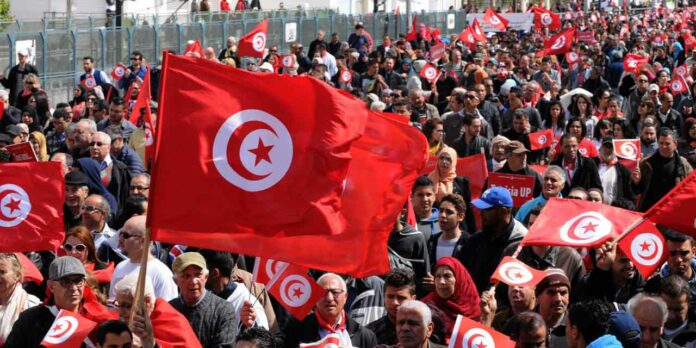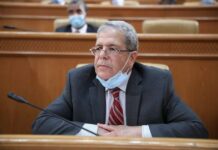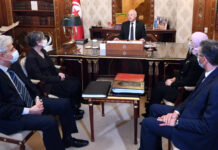Tunisian President Kais Saied has broken with the policy that has prevailed in the country since the fall of the regime of President Zine El Abidine Ben Ali in 2011. This policy consists in the intervention of parties and organizations to solve political crises, which has produced a political scene based on quotas between parties and organizations.
On Thursday, Kais Saied announced the imminent formation of the Tunisian government. The President has ignored indirect calls by some parties to involve them in the political process by repeating the talk about the need to speed up the formation of the government.
During his meeting with the Minister of Social Affairs, Mohamed Trabelsi and Siham Al-Boughdiri Nemsiah, who is in charge of running the Ministry of Economy, Finance and Investment Support, President Kais Saied said that the composition of the new government will be announced in the next few days.
President Said stressed that “the state is going on and its public facilities are going on, and there are patriots working hard in the administration inside the Tunisian state.” And he added, “They want to banish the state and keep a government and a handful of people looting the Tunisian people (…) There is no room for these in the future.”
President Kais Saied rejected the roadmap presented by the Tunisian General Labor Union, the largest trade union organization in the country, whose political influence increased after the fall of the regime of former President Ben Ali.
“The road map is one of the concepts that comes to us from abroad (…) and the only road map that I follow, and I will follow with firmness and determination, is the map drawn up by the Tunisian people,” said Kais Saied.
President Saied reiterated that “there is a working government [now] and a working state, and there is no going back, and the people will have their full right.”
It is clear that President Saied wants to put an end to the exaggeration in the consensus and the interference of parties and organizations, an exaggeration that characterized the era of President Beji Caid Essebsi, as these structures did not hesitate to interfere in the tasks of the head of state.
In the last days of his rule, Caid Essebsi tried to reconsider this policy, and began to escalate, but he fell ill and months later died in July 2019.
Therefore, it can be said that Kais Saied has been in the process of breaking with the usual ways of forming governments in Tunisia for years. He not only excluded parties from government formation consultations, but also excluded organizations.
It can also be said that Kais Saied is also in the process of breaking with the methods that were adopted during the period from 2011 to 2021 in managing public affairs in the country; He is limiting the role of parties and organizations, continuing the approach he has chosen since the 25th of July.
Through this, he aims to achieve several goals; the most important of which is not to disperse power and take into account the current constitutional situation, as the government’s formation and program are supposed to pass through Parliament, but the parliament is frozen.
The government team will be closer to the orientations of President Saied, as he is now a project holder and is at the forefront of events alone. Kais Saied will exclude parties and organizations from the prospective government.
The role of the organizations increased significantly during the political crisis that followed the assassination of parliamentarian Mohamed Brahmi in July 2014, which was preceded by the assassination of the leftist opposition figure, Chokri Belaid, in February of the same year.
The Labor Union, the Tunisian Union of Trade and Industry and the National Lawyers’ Association, in addition to the National Commission for Human Rights, led the national dialogue that ended with the formation of a government headed by Mehdi Jomaa at the end of 2014, which was considered a victory at the time.
The Dialogue Quartet won the Nobel Peace Prize, which explained an international support for its role, which encouraged it – especially the Labor Union and the Tunisian Union of Trade and Industry – to further interfere in political affairs. Over the past years, for instance, the Ministry of Social Affairs has been part of the labor union’s share.
The attempts of the Tunisian Union of Trade and Industry to seize control of the country’s political affairs and enter decisively in the political game and the general policy of the state were also clearly demonstrated, which was evident through the candidacy of a number of businessmen for the legislative elections, after which they were granted some positions such as appointing a businesswoman, Salma Elloumi, Minister of Tourism.
Movements made by the organization when it was led by its former president, Widad Bouchamaoui, also raised a lot of questions after receiving diplomatic delegations to discuss “Tunisian economic relations” with foreign countries and to discuss efforts to “encourage investment.” This, in fact, goes beyond the traditional role of this organization at the expense of Tunisian diplomacy.
Since the Tunisian president announced his measures on the twenty-fifth of last July of freezing parliament and dismissing the prime minister, the two organizations seemed concerned. Therefore, the heads of the two organizations hurried to meet with Kais Saied in the following days. The Tunisian Union of Trade and Industry did not welcome the actions of Kais Saied and called on the president, in a statement, to form a government of competencies and preserve “the gains that have been made for Tunisia.”
In turn, the Labor Union did not hide its apprehension about the actions of Kais Saied, as the Assistant Secretary-General of the Union, Sami Al-Tahri, confirmed after the announcement of the road map that “the union hopes to overcome the exceptional stage safely despite its apprehension about this exceptional circumstance.”











